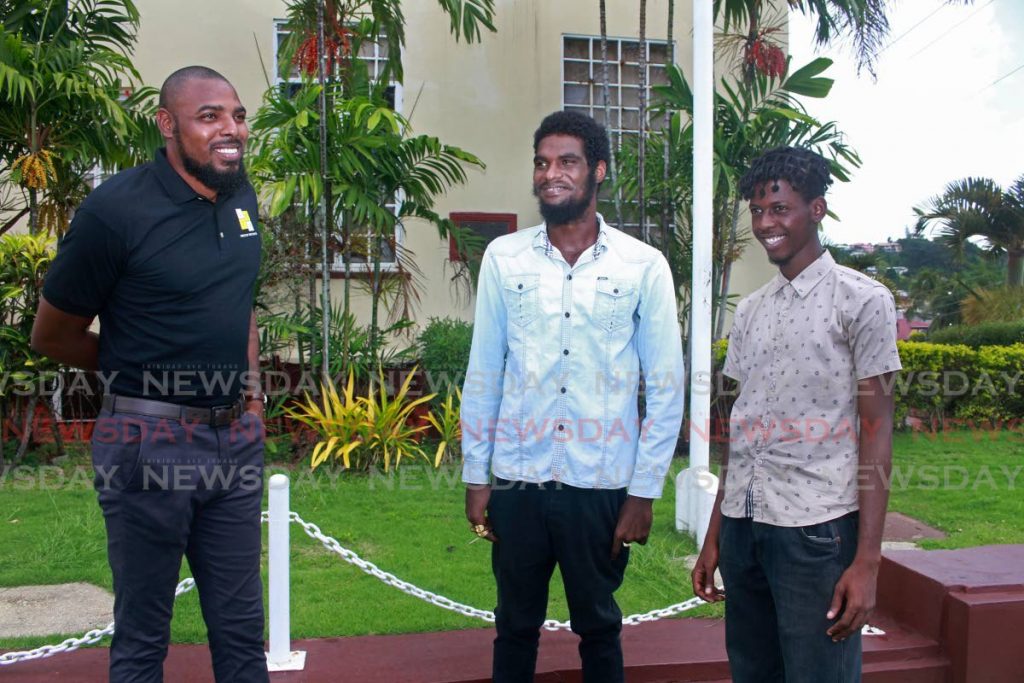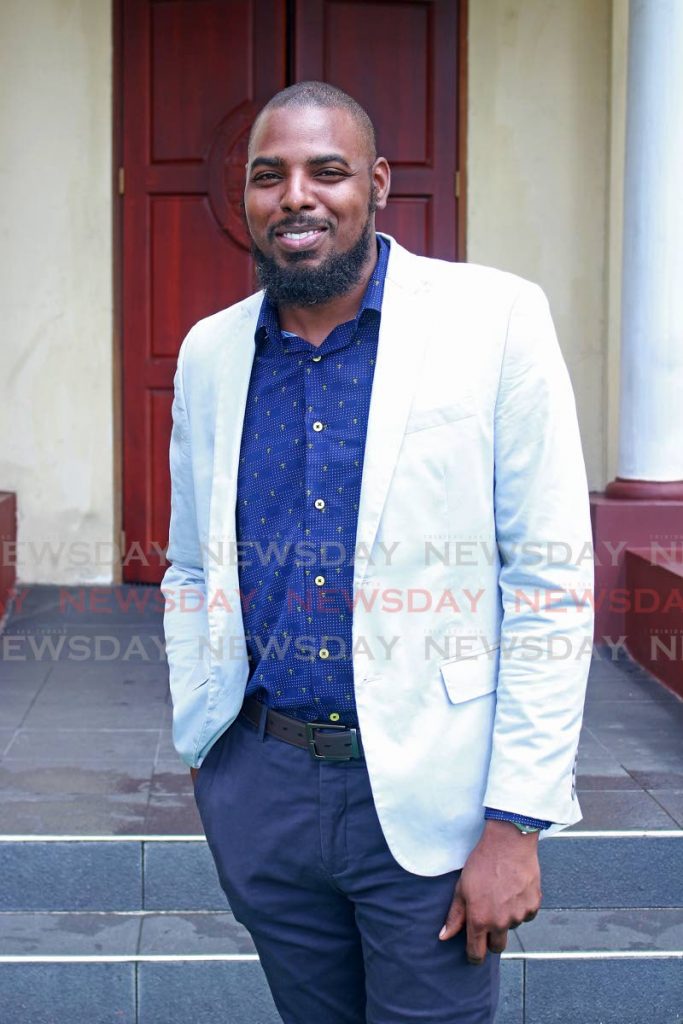Coast Guard mechanic, a mentor for troubled youth

Makell Baptiste was once what can be considered an at-risk youth. In fact, he was labelled troubled.
His parents separated when he was ten and he had issues in school.
“Growing up, my father and mother separated which had a very tremendous impact on my life,” he told Sunday Newsday in a recent interview.
“I didn’t like school and hated it with a passion. I was miserable and fighting (in secondary school).”
Frustrated, Baptiste dropped out of school in form four. This was in 2007 and he'd been attending El Dorado West Secondary.
But all was not lost for Baptiste. His mother, psychologist Dr Joanne Spence, convinced him to find a skill he was interested in and to take a course to learn it.
“She (my mother) realised I didn’t like school, but she made sure I went along the right path.”
That turned out to be auto mechanics. He began a course, in auto and diesel mechanics with the Academy of Auto Mechanics in Tunapuna, the year before he quit school. The following year, he landed a job as a mechanic with Service Air at the Piarco International Airport. He worked there until 2009, the year he decided to join the Coast Guard.
He is currently a mechanic in the Coast Guard and his duties include repairing vehicles.
Baptiste is also one of the Coast Guard’s representatives for the Military-Led Academic Training (MiLAT) Programme. He serves on the youth mentorship team for young men in the programme.
“My aunt was a member of TT Defence Force. As a young person, I always liked the uniform. Apart from that, I always had a passion to enter into the TT Defence Force and serve.”
Joining the service, he said, helped him find a greater sense of purpose.
But it was an experience the previous year that opened his eyes to how fortunate he was, and how different his life could have been.
His church's youth ministry arranged a visit to what was then the Youth Training Centre (YTC). Young male offenders between the ages of 16 and 18 are sentenced to the Arouca centre, now known as the Youth Transformation and Rehabilitation Centre (YTRC), for what is supposed to be a term of between three and four years.
“They didn’t have someone to talk and lead them to the right path. The people they would normally turn and talk to were people dealing with drugs or illegal stuff.”
Baptiste realised that with the attitude he'd had towards life a few years earlier, he could quite have easily become one of the young men in the centre. Reflecting on his years as a “troubled” youth, he knew he was still privileged; his mother was a psychologist and he had resources. The young men he'd met at centre did not have similar resources and support systems. Some didn't have proper father figures.
And though his parents separated, and Baptiste lived with his mother, he still maintained a relationship with his father.
This experience fuelled his resolve to help young people who'd had a rocky start in life like he did, to reach their full potential and become productive citizens.

He believes most of the young men at the centre are there because they kept bad company or were in the wrong place at the wrong time. However, he understands their situation.
“As a young person, you don’t need support from just anybody but somebody leading you in the right direction.”
He kept in touch with some of the young men he met at the centre and on their release, helped them reintegrate into society and tried to deter them from returning to their previous lifestyles.
He said, “If we don’t give them these chances (when they are released) then they’ll return to crime. Then the older heads will turn and question why they are doing crime. But then we must realize we don’t give them chances as an individual.”
Helping them find jobs was difficult; even with letters of recommendation from Baptiste, employers were hesitant.
He often explained to potential employers that he is a coast guardsman and vouched to the characters of the young men.
He assured, “It’s not like I didn’t know these individuals and I just recommended them because I wanted them to get a job. I knew these individuals through my interactions. You cannot judge someone by their past because people change.”
He told Sunday Newsday all the young men who have gotten jobs have been sterling employees, with some even copping employee of the month awards.
He continues to mentor them and is hopeful they have started successful reintegration into society.
In 2017, Baptiste took his drive a step further and founded the Voice of the Youths Foundation through which he aims to reintegrate at-risk youths into society. He hopes to rally a community of support, guidance, and resources behind at-risk youths.
The foundation is a registered non-profit organisation and is based in Baptiste’s home community of Bon Air Gardens.
Four core members maintain the foundation’s operations, but he is working towards developing an official board of directors.
Outside of the core members, different volunteers would regularly assist in the group’s activities.
“I will like people to become a part of the foundation so we can help our nation’s youths. I want as many people on board so that we can reach as many young people as we can.”
Before covid19, Baptiste also visited schools, sharing his experiences, and encouraging youths to live productive lives by explaining the consequences of not doing so.
“The first school (at which) I spoke to students was San Juan South Secondary School. I would go into different areas, in the communities of the different schools I visited, and talk to young men in the communities,” he said.
For now, due to covid19 restrictions, the foundation’s outreach activities are online. Young people can seek advice by sending messages via the foundation’s website.
The foundation also does other charitable initiatives.
Starting in March, at the onset of the covid19 pandemic, the foundation has distributed food hampers to under-privileged families.
While rewarding thus far, there have been challenging aspects to Baptiste’s work.
“At the beginning (of the foundation), I had that issue where a lot of young people didn’t want to talk to me because I was from the service.”
He doesn’t ignore the dynamic that some at-risk youths have problems responding to authority. Being a member of the protective services can add an extra barrier. He tries to break these walls by telling his story, raw and unfiltered. This helps build a rapport, he said.
“I don’t talk to young people (about anything) if I never experienced it in my life. As I young person I knew how to 'wrap ah weed' and held an illegal firearm. I know about hustling and washing car to make money.”
His direct communication style has been effective; lending a listening ear and giving advice in return can make all the difference for at-risk youth.
While Baptiste is building bridges, he knows members of the protective services in TT must do more to build a rapport especially with youths in under-privileged communities.
Initiatives like the police youth clubs are commended, but Baptiste says there needs to be more especially by different arms of the protective services. Efforts like this can help build trust.
Members of the protective services, he said, must also be mindful of their interactions with at-risk youths. The mindset of “going to war” and aggressive tactics simply will not work. Baptiste said this a leading cause for the tense relationship between at-risk youths and members of the protective services.
“The protective services need to understand and learn that there are certain ways you can deal with situations.
With his fellow coast guard officers already supporting his work, by participating in the foundation’s school speaking engagement, he plans to collaborate with other arms of the protective service.
He's also willing to help the recently established Community Recovery Committee deal with the issue of at-risk youths and policing.
For now, Baptiste is continuing his foundation’s work. He thanks his mother who also support the foundation’s activities with psychological services.
What’s next on the agenda? A free nationwide lessons initiative called Level Up Lessons. This initiative will aim to help primary school students with their school work.
While the initiative's nationwide roll-out was delayed, due to covid19, he is safely hosting a pilot of the project at the Bon Air community centre. In keeping with current covid19 guidelines, small classes of five or less primary school students are given free lessons in Math and English. Children without digital devices to do online learning are given priority. A few teachers are volunteering for the pilot.
But when it goes nationwide, Baptiste hopes more teachers come on-board.
Baptiste has been able to liaise with some primary school teachers, in different communities, to discuss the idea.
They are now looking at possible venues and a solid curriculum for the initiative. Outside of teaching, students of the initiative will be taken on field trips across TT to learn more about the country.
The goal of the field trips? To produce patriotic citizens who are knowledgeable about their country.
He is hopeful that with greater community efforts; social issues like crime will be reduced as at-risk youths become productive citizens.
People interested in contributing to Baptiste’s foundation, in any way, can do so by sending a message to the foundation’s Instagram page: @voice_ofthe_youths or send an email to: successfulvoty@gmail.com. Young people in need of advice, on any life problem, can reach out to the foundation at its website: www.votytt.org


Comments
"Coast Guard mechanic, a mentor for troubled youth"